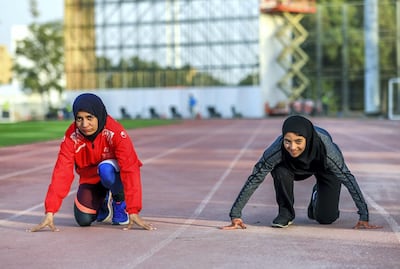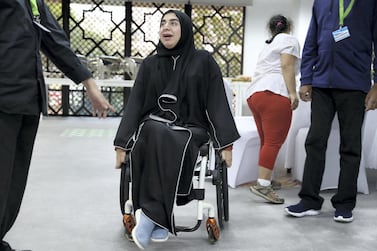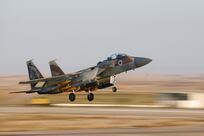Every time Emirati sprint star Hamda Al Hosani steps out on the track she has two goals in mind – to win more medals and to challenge misconceptions about people with special needs.
With every podium place she achieves – the tenacious 29-year-old has 17 Special Olympics medals to her name – she moves a step closer to achieving those goals.
Al Hosani is one of the most celebrated athletes taking part in the Special Olympics World Games Abu Dhabi. Her image is emblazoned on the livery of an Etihad plane to mark the event’s debut in the Middle East, and she is hoping that the recognition will inspire others to follow in her footsteps.
Thanks to her dedication, determination and no shortage of talent, she has become a figurehead for the Special Olympics movement, with a burning desire for victory.
“I want to win more and more,” said the all-conquering sprinter, who is one of about 7,500 athletes competing in the global competition.
“People think special needs is bad. I want to change this.”
Her latest successes were also on home soil at the Mena Games in March last year in Abu Dhabi, where she won gold in the 100 metres competition and silver in the 200m.
She is always the first athlete on the Zayed Sports City Stadium track where the team trains several times a week, and is also the last to leave.
Al Hosani has epilepsy but has never let the condition stop her in her tracks.
The runner has had mild seizures on the track but gets back in the thick of the action as soon as she recovers.
Overcoming challenges is nothing new for her. When Al Hosani was struggling to walk in Grade 6 after health difficulties, it was her mother who helped her on the road to recovery and ensured she pursued her ambitions of being a runner.
Now Al Hosani is eager to encourage children with disabilities to pick up the baton and embrace sport.
“Sports give children a good life,” Al Hosani said. “It allows them to believe in themselves.”
Asked how she deals with the pressure of a big race, she has a straightforward reply.
“When I get scared, I remember all people love me.
“When I win gold, it is for my country, my president, not for me.”
Her positive attitude is infectious, not least for her teammates and coaches.
“For me she is always a champion,” said Naila Khemis, an athletics coach for the UAE team.
“I wish I had 10 of her. She is a very good example to follow.”
Al Hosani is also a natural mentor and is being groomed to coach the UAE Special Olympics athletics squad, Khemis said.
But the medallist has made it clear that she is not ready to hang up her running shoes just yet.
At a recent training session, younger athletes gathered around her after she completed several sets of sprints, keen to pick up tips.
Teammate Mouza Al Hamed, 24, said she has a lot to learn from Al Hosani and the camaraderie and affection between the two is evident.
Athletics is not the their only bond. Al Hosani teaches Arabic to the younger runner and learns English from her.
“I like to teach everything I know. I want to see Mouza sprint like me. People like Mouza want love. She likes people joking with her,” Al Hosani said.
Al Hamed’s voice rose in excitement as she talked about her family watching her compete in races in Dubai during the eight-day event.

“They will see me run in Dubai. I feel happy I am running so well. I like to work hard. I like doing sports every day,” she said.
“Hamda helps me to win. She tells me how to run.”
The close-knit team of 16 athletes and four coaches function almost like a family unit. The coach regards her role as being like that of an older sister.
She believes people will be inspired when they watch athletes at the Games.
“I have seen what they can do. They challenge everything,” Khemis said.
“They don’t have a normal life but they try to. They change the world. They make me stronger. There is a strong positive vibe in them.”
The UAE team will be among more than 190 national squads participating in the sporting spectacle from March 14 to 21.
Khemis believes sports are being vital to get people with disabilities out of their shells.
“I tell parents to take their children out. Let them practise any sport,” she said.
“Let them go walking or to the pool, the stadium. Let them go out in the open air. Let them meet and speak to others.
“I invite all parents and families to come and see them on the field. Then, they will be really convinced about what they can do.”
While the athletes talk of winning gold, the coach said the taking part really does count, too.
“The important thing people must know is that the Special Olympics is not about medals. It is so the person feels she is part of society and can achieve something.
“For me, they have succeeded if an athlete knows where to run, where to start and where to end a race. For me, she is already a winner.”





